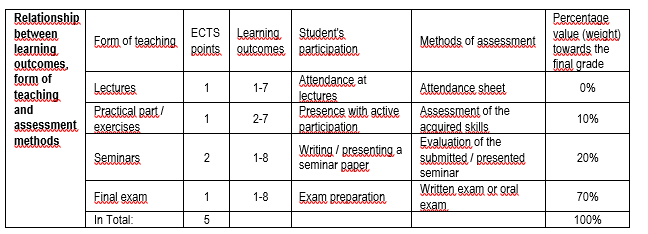Acquiring knowledge and skills necessary for planning and conducting the physical therapy process in the field of neurology, psychiatry and geriatrics.
Physical therapy in neurology: Physiotherapeutic process in neurological physical therapy. Neurophysiologic foundations in neurological physical therapy, hierarchical and parallel organisation of the central nervous system, central control mechanism,characteristics of normal movement,normaland automatic postural reactions, balance reaction, voluntary and automatic movements, functional movement. Analysis of components of normal movement and motor activity:lying,sitting and standing posturalset,as well as activities of transfer between postural sets and complex functional activities.Functional levels of a person according to the classification ICF-a (WHO, 2001). Fundamental principles of applying physical therapy concepts for adults with neurological disorders. Bobath concept for adults with central disorders; check-up, analysis, treatment and evaluation. Specific aspects of physical therapy check-ups andtreatments for individuals with hemiplegia or hemiparesis, and individuals with craniocerebral trauma, problems with spasticity and associated reactions, problem with compensation, specific aspects of treatment for individuals with Parkinson’s and individuals with multiple sclerosis, specific aspects of physical therapy for individuals with spinal injuries, physical therapy for individuals with peripheral lesions, physical therapy for individuals with neuromuscular diseases.
Physical therapy in psychiatry: Physiotherapeutic process for individuals with neurotic disorders, affective disorders, schizophrenia, posttraumatic syndrome, manic syndrome, depressive syndrome, anorexia nervosa and for individuals with psychosomatic disorders.
Physical therapyugeriatrics:Specific aspects of physical therapy processingeriatrics,andspecific aspects of group physical therapy.
Obavezna literatura:
- Grozdek G, Maček Z. Osnove Bobath koncepcije – Interna skripta za studente 2. godine smjera Fizioterapije. Zagreb: Medicinski fakultet Sveučilišta u Zagrebu; 1995.
- Grozdek G, Maček Z. Utjecaj programa neurofacilitacijske terapije – NFT na promjene nekih svakodnevnih motoričkih aktivnosti u osoba s teškim ozljedama mozga. Fizioterapija. 1997; 1:3. str. 23-33.
Dopunska literatura:
- Judaš M, Kostović I. Temelji neuroznanosti. Zagreb: MD; 1997. (izabrana poglavlja)
- Edwards S. Neurological Physiotherapy: A Problem-Solving Approach. London, UK: Churchill Livingstone; 2000. (izabrana poglavlja).
- Davies PM. Right in the Middle. Berlin, Njemačka: Springer-Verlag; 1990.
Upon completion of this course, students will be able to:
1. Recognize and critically evaluate the specifics of different models of physiotherapy in people with neurological disorders and diseases.
2. Recognize and critically evaluate the specifics of physiotherapy in persons suffering and treated for psychiatric diseases
3. Recognize and critically evaluate the specifics of different models of physiotherapy in geriatrics
4. Apply physiotherapy procedures during the treatment of neurological and psychiatric diseases
5. Apply physiotherapy procedures during the treatment of geriatric patients
6. Assess and critically analyze the effects of the physiotherapy process in people with neurological and psychiatric diseases
7. Assess and critically analyze the effects of the physiotherapy process in geriatrics
8. Actively participate in teamwork



